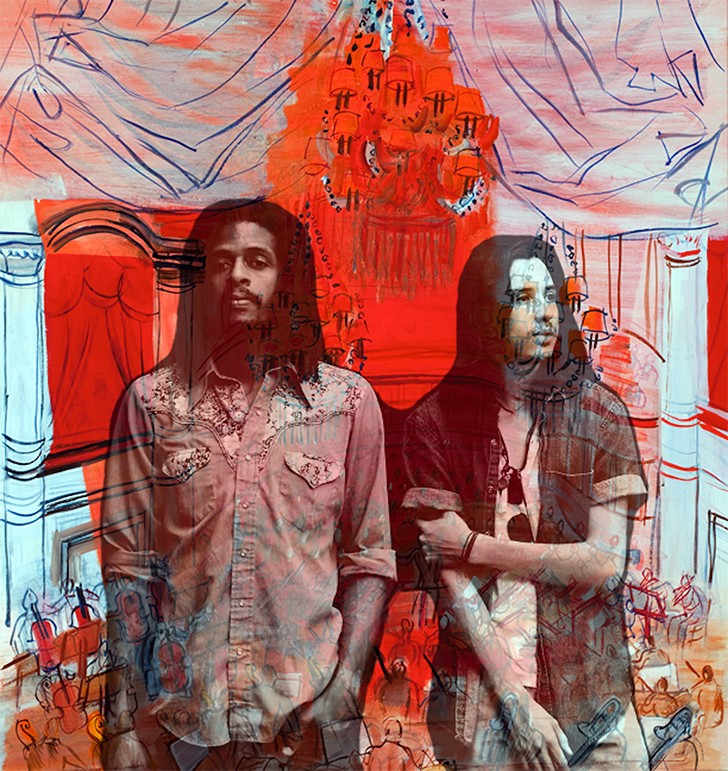San Antonio desert-rock duo Lonely Horse makes a cactus-ache groan, a man-hurt ruckus, a no-bullshit, scarred and angst-charred plea for mercy and/or redemption in jagged sonic form. The band's songs, collaborative efforts between singer-songwriter-guitarist Nick Long and drummer Travis Hild, seem to saunter back from vision quests, with bleary eyes, focused on the elemental hope and strife of human existence.
You may have seen them around. You were sipping your seasonal beverage of choice and hoping to avoid high-emotion, and then you were devastated and unhinged. You were confused and delighted that a band, local or otherwise, had bothered to plumb and plot ceremonial ground with the rude implements of rock 'n' roll.
You dug their self-released Desert Son EP for its raw energy and spiritual aftertastes, you heard that Long, Mr. Lonely Horse himself, crafted these tear-sticky garage rock songs out of his suffering and that his anger was as real as his musical inventiveness and his organic virtuosity on guitar. You voted for the duo to play Afro Punk (and were stoked when they won that subsequent battle of the bands). Maybe you bought some custom-made moccasins and waited eagerly for news of a big recording deal, then you heard they were being courted by labels and cutting a debut LP at Sonic Ranch.
You liked Instagram pics of those recording sessions and wondered what was holding back the deals, the national headlining tours and the success that seemed so well-deserved, for reasons of the heart and reasons of the craft. You heard that debut LP and it delivered on every promised transfiguration. In response to your unspoken curiosity, you learned that the band had inked a deal with Nouveau Riche Records, run by local Santiago Ortega with nebulous ties to Atlantic Records. And you read a barrage of Facebook confessionals about how that deal went sour, and the Lonely Horse, with all that muscle and mad-majesty, was bound for glue.
You no doubt heard that, because of the agreement and subsequent disagreements with Ortega, their December residency at Hi-Tones was the locally cherished twosome's last hurrah. Perhaps you even read a recent San Antonio Express-News article on the band's fizzle and were perplexed that it didn't quite answer your questions. If all this describes your experience, then we're on the same page.
I recently spoke with both Long and Ortega. I was able, after reviewing contracts and addendums, and hearing emotionally charged critiques aplenty, to glean the following facts and fuzzy bits about the whole business. It's my hope that you'll play the judge here and decide for yourself what matters, both in terms of legality and good faith.
The deal, signed in January 2014 and amended in December 2014, is pretty basic. It grants Nouveau Riche Records and Ortega all rights to Lonely Horse and its recordings. It also stipulates that money put forward is due back (one way or another) and that Nouveau Riche reserves the right to cancel shows and essentially determine all of the band's business decisions.
Long maintains that, in hindsight, Ortega took advantage of him at a desperate moment, with a nasty divorce and custody case (part of the subject matter in the band's songs) looming in the background.
Long/Lonely Horse's gripe is essentially trifold: 1. Ortega blew smoke up their asses and never really had a good lead on a contract or promoted the band properly to national markets. 2. Ortega was greedy at moments when deals outside of Atlantic were available and asked for an unreasonable buy-out or unnecessarily cushy percentage deals. 3. Ortega has forced the band to call it quits because he won't promote the band properly, let them out of their deal fairly or partner with them in seeking a reasonable outside deal.
Ortega maintains that he unsuccessfully pitched the band to Atlantic (Long insists that this failure was due to Ortega's impatience in not waiting to pitch the mastered album), but has promoted them adequately and sought out press per the contract. He believes that the band's unprofessionalism and knee-jerk reactions (including damaging the label's credibility on social media) have cost them. Lastly, he insists that if Lonely Horse would just sell the album, My Desert Son (which was paid for by Nouveau Riche), and cooperate, the two parties could still work together.
Neither party has filed legal action. Lonely Horse plans to officially dissolve, for the time being at least, until released from contract or alternate agreements can be reached. Both parties spoke of (albeit diminished) mutual respect and the possibility of legal and personal reconciliation.
Long and Hild, being proactive musical talents, have several new projects in the works. We'll see what they come up with next.


